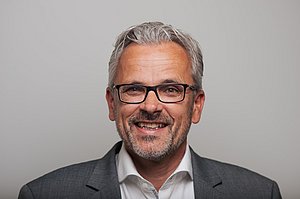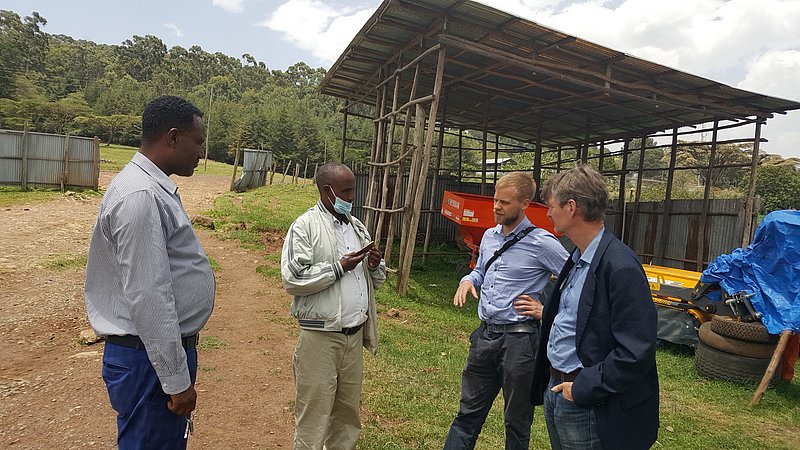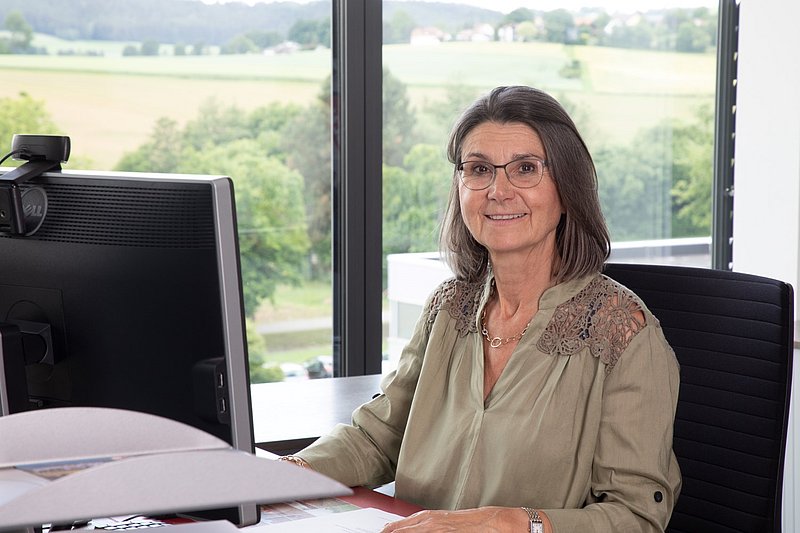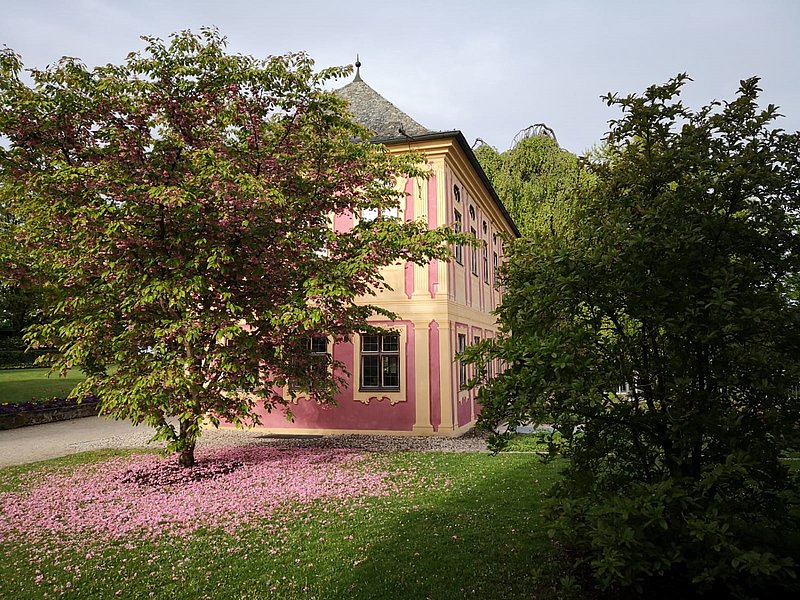Teaching for practice
The Hochschule für angewandte Wissenschaften (University of Applied Sciences) Weihenstephan-Triesdorf – in short: HSWT – is located at two sites: the campus Weihenstephan in Freising as well as Triesdorf. Since his inauguration President Dr. Eric Veulliet has been tackling a lot of modifications so that the university becomes more visible on an international level and that the faculties close ranks. The research of the latter mainly is practical-related and thus, they deliver relevant results for economy and industry.

Personal data: Eric Veulliet
In autumn 2017, Dr. Eric Veulliet became president of the University of Applied Sciences Weihenstephan-Triesdorf and describes himself as a neo-Tyrolean-Franco-German. “Neo-Tyrolean as I have been living in Tyrol for exactly 20 years and I am half French and half German.”
After having finished his studies of geology in Würzburg and of hydrogeology in Karlsruhe where he also did his doctor’s degree, he joined an engineering company that worked in the sector of remediation of contaminated sites and environmental remediation in 1993. He worked in different companies, among others as project and division manager.
“At that time, I was constantly away on business and partly I did not know in which town I was at the moment. Until it became too much. When in 2002 I was offered to build up a research centre for natural hazards and risk management in Innsbruck from scratch, I immediately accepted. I built up respectively headed the research centre for 15 years and then turned it into a centre for climate change and adaptation technologies.” The objective was to find solutions for the climate change to reduce its negative impact by appropriate technologies. But the at that time lacking consciousness for climate change in politics and society did not make things easy for Eric Veulliet. After 15 years, the funds for the research centre were reduced severely. “We were way ahead of our time and simply had entered the market too early.” Shortly after that Eric Veulliet met a new challenge and in 2017 accepted the offer to become the president of the HSWT.
Key aspects and differences compared to traditional universities
The HSWT was founded in 1971 and celebrated its 50th birthday last year. It started as a technical college and today is a university of applied sciences which is well on the way to international visibility and attractiveness. “We are well set and we are in the process of becoming a state-of-the-art university with all the trimmings. In a branding process we also defined a new claim. “Applied Sciences for Life” now also is our new mission statement. So far it had been “Green, innovative, practical”.”
This new claim puts it in a nutshell: the HSWT dedicates itself to the applied sciences for life. In the seven faculties, among others biotechnology, bioinformatics, nutrition technology, sustainable agricultural and energy systems, agriculture etc. are taught and researched.
The main task, however, is not the mere basic research and the currency of success are not only publications. The focus of the HSWT rather is on the benefit for the region, for society as well as for industry and economy. These also are the main differences compared to traditional universities. Another difference for example is the duration of the bachelor programs. At the HSWT, they take seven semesters, at traditional universities it only takes six semesters to get the bachelor diploma. Eric Veulliet tells us why: “At the HSWT an internship in a company is obligatory to make sure that the students also experience the practical component. For the connection to economy and the corresponding exchange are important. It is what makes the difference, it is our central theme. The education of the graduates of the other universities is not worse, but different. It is more about the basics in the scientific and theoretical sector.”
The “for Life“ part of the claim is not only aimed at lifelong learning but also at learning for life, people and nature. According to Veulliet, continuing education is important for all categories, social classes and age groups. “We live and learn! Continuing education just is in the stage of the disruptive change, of digitalisation, internationalisation, probably of an adapted globalisation, a core element for the success of a region“. A continuing education beyond the professional training plays a major role. In the newly founded ZI (centre for continuing education) the HSWT offers programs with costs, e.g. a master program in animal health, that interested persons can pass part-time. It also is possible to get certificates. “Our team successively expands the offers in this sector. However, in addition to our public pillar, this is rather a private one. We organise continuing education programs that people can attend as customers, among others in the sectors of digitalisation, management or agriculture, e.g. herd management etc.”
Sustainability as a compass
Sustainability is the big frame around everything that happens or is taught at the HSWT. “We are the university for applied sciences, for green technologies, climate change and sustainability. Sustainability is our compass“. Eric Veulliet provides a very pictorial description for sustainability: he compares it to a tray with glasses on it. “Imaging you hold the tray on your hand. To keep it stable you have to hold it with at least three fingers. With only two fingers the whole matter will get very wobbly. And you would have to be an acrobat to hold and stabilise the tray with only one finger.”
He is talking about a three-column-principle respectively about the “Triple Bottom Line” approach. It says that sustainability is the balance between ecological, economical and society respectively social aspects. The pre-requisite is that there really are all three columns – and it is particularly important that they are in balance. Thus, the system remains stable. If you remove only one column, you cannot be successful, and you will end up with a pile of broken glass. “And if someone tells you about ecological sustainability, the person has not understood anything at all. For sustainability is ecological per se”.
The HSWT is the first public university in Germany that is EMASplus certified. „EMASplus is based on the EMAS system (Eco Management and Audit Scheme) but adds social and economic aspects to the environmental management”, Eric Veulliet explains. Thus, in the past years the HSWT also developed into a climate change university. Approx. one third of 24 new research professorships focus on the topic agriculture and nutrition. If you consider climate change, nutrition, agriculture along the whole value chain, you will not get around the HSWT. “And this will be one of the new big key aspects: sustainability, climate change and nutrition along the whole value chain – from the field to the plate. I.e. it will include supply, food, nutrition, new food technology, new food systems and all the trimmings“.
New focus Africa
Moreover, the HSWT has set another focus in Africa and has become involved in ten to eleven countries, among others in Kenya, Uganda, Senegal, Togo, Tunisia. In some of these countries the master program for example is adopted one-to-one. Other nations, too, have adopted the HSWT programs – in English, German or French language, from Thailand to South America. A successful model based on the example of the HSWT that is already used by 30 universities and technical colleges all over the world. “In my opinion, Africa is the most important continent with the biggest potential in the coming years and decades where you can enter the market at all. Especially in the agricultural and the food sector.”
However, the extremely high losses along the value chain are a big problem of the agricultural sector Africa. The theoretical part in training and studies still is too high. “We have partners, e.g. in Kenya, where there are students who study agriculture and leave the universities or technical colleges without ever having held a clod of earth in their hands. They have theoretical knowledge, but no practical experience at all. The postharvest losses alone amount to partly 40%. This is alarming. How can a country that has enormous production difficulties anyway, lose so much yield after the production?! It is about transport, logistics, storage, cooling, processing. And I do not talk about high-tech but rather of low-tech. This and a little training would make an enormous difference in Africa“.

Something has to be done to make sure that Africa will become able to supply its people. “Agriculture respectively food production is the key – also for the development and for the protection of Europe. And from a political point of view. Everyone with an open eye for the future knows that the population of Africa which currently already amounts to more than one billion will at least double until the middle of the century and quadruple until the end of the century. In the context of the climate change, we are talking about more than 100 million of people who might become climate refugees if they are no longer able to live in their own countries. Safeguarding the food supply in Africa is an essential point for all of us“. The export of know-how is part of it. It is important to also take the parts and economic partners along on the journey and to create connections.
The objective of the foundation of the HSWT International School is to train more international students in Triesdorf. They can for example study International Farm Management. Just under 300 international students are studying in the agricultural sector of the HSWT. The objective is to help about 1,000 international students per year to pass their exam – with the focus on Africa and Asia respectively Central Asia. “Unfortunately, currently we do not yet know where we are going to accommodate them. We need an international hall. At the moment, we are looking for financers and people who support us with regard to building a hall with 200 rooms and beds. It will not be a problem to fill the programs. The demand for a practical, applied training in the agricultural and food sector is enormous all over the world”.
Connection to economy and to HORSCH
For a university to be practical and “applied“, it needs a close connection to companies. They are important partners especially along the value chain.
“On the one hand the companies, of course, want to remain on the market as well as recognise the market and get the appropriate people and human resources that are important to develop business in a national and international context. In my opinion, HORSCH is a global player – without wanting to flatter them – a perfect medium-sized company that is optimally positioned and operates in exactly this segment respectively in this value chain. Specialised in one sector. And our graduates and our topics are a perfect match“.

Cornelia Horsch, too, is convinced that there is a benefit for both sides. She has been volunteering at the HSWT since 2018 to encourage the exchange between research and teaching and the companies as well as to find new solutions together. “We as a family and as a company consider it to be a societal duty and responsibility to get involved in the education and training of young people”, she emphasis. “And the topics that can be studied are directly linked to our sector. There always are well trained graduates from the universities and technical colleges who optimally fit into companies like ours. We do research with some professors and encourage the mutual exchange or give new impulses and ideas. The HSWT’s commitment in Africa also is very interesting for us a company – from an economic point of view but also with regard to the HORSCH Foundation“. The university benefits from the requirements of the economy and thus can see where the developments are headed in the future. And the economy in turn benefits from the findings of science.
Eric Veulliet, too, considers this symbiosis to be very important. “It strengthens Bavaria as a business, research and training location. This partnership is very important to withstand the national and international competition. Sometimes economy is faster than we are as the market or the world outside the university turns faster than the university itself. This mainly happens in processes of the disruptive change we are facing just now. We then have to take up the speed of the outside world. Sometimes it is the other way round”. His task as a president is to synchronise the speed between university and economy and to try to take everyone along in equal measure and to bear and support the changes. How fast these changes happen, also depends on the corporate culture and the socialisation in the company.
“In total, we now have more than 1,100 employees including the visiting lecturers and more than 6,000 students. I.e. our system includes more than 7,000 people. It is hardly possible to move such a large number in one direction at the same time. It is a real challenge but it also is great fun“.
Where will the journey take us – also from a research point of view?
Before the end of the year the BayFIT, Centre for University and Sustainability Bavaria, will be founded based on the Bavarian network with the same name. This centre will provide all Bavarian universities with a central platform to integrate sustainability in teaching, research, knowledge transfer and the activities on the campus to an even greater extent.
In addition – also before the end of this year – the B.Life will be founded at the HSWT, a competence centre for climate change management with a focus on a sustainable use of land and resources. At the moment, Eric Veulliet is interviewing potential candidates to head this centre and finally get started. He already got the binding promise that he will get more resources for this sector (professorships, funding).
“I like to compare it with a washing machine full of coloured laundry. During the washing process the laundry entangles. The university system is quite similar. The central university system which already is very complex and entangled in itself is influenced by different external drivers, i.e. internationalisation, globalisation, legal, financial and societal frame conditions, climate change, sustainability, digitalisation, diversity and equality etc. They turn to the left, then to the right, once they turn faster, then slower again. The challenge is that the university finds the right answer to these drivers – with regard to strength, orientation and success”.

Thus, as a reaction to the challenge internationalisation for example the foundation of the HSWT International School and the topic Africa are pursued continuously to take applied, practical education abroad – according to the HSWT claim “Applied Sciences for Life”.